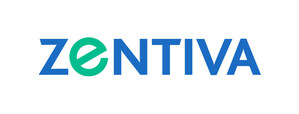77 % do not believe the framework for generic medicines is sustainable
BRUSSELS and PRAGUE, Dec. 17, 2024 /PRNewswire/ -- A live survey conducted during the "European Health Check" revealed that 77% of participants do not believe the current systemic framework applied to the generics industry is sustainable or effectively ensures the availability and accessibility of medicines for patients across the EU. This eye-opening result underscores the critical need for systemic reforms to support the generics industry, which is fundamental to delivering affordable and accessible healthcare in Europe. The event gathered together generics industry leaders, policymakers, and healthcare professionals and was hosted by PoliticoLive and sponsored by Zentiva.
With generics accounting for 70% of medicines in Europe, including 9 out of 10 medicines on the critical medicines list, these treatments form the backbone of public health, yet they face mounting challenges.
"Generic medicines are the cornerstone of Europe's healthcare system, but they face increasing pressure from fragmented regulations, price caps, and the bureaucratic implementation of the European Green Deal. Europe needs to remain competitive. Our healthcare system is unique, with high standards and a commitment to leaving no one behind," said Ines Windisch, Head of Communications, Corporate Affairs, and Sustainability at Zentiva, who opened the discussion and continued: "The Critical Medicines Act is a necessary step forward, but it must renew the regulatory framework and provide manufacturing incentives to ensure medicines remain accessible, affordable, and sustainable for those who depend on them every day. Let's make our discussions not just theoretical, but a catalyst for real, impactful change."
As part of the event, top representatives from key EU institutions, European Parliament, a national government office and Medicines for Europe association examined the challenges and opportunities facing the off-patent pharmaceutical sector, sharing insights that addressed regulatory, economic, and societal dimensions
Key takeaways included the emerging risk of medicine shortages. While reporting and mitigation measures are advancing, fragmented stockpiling policies in larger Member States risk leaving smaller countries vulnerable. This not only contradicts the solidarity principle of the European Union but also burdens the industry with added costs and administrative demands, coupled with the risk that medicines might ultimately go to waste.
The Urban Waste Water Treatment Directive also drew attention. Despite concerns from 16 Member States, the directive passed approvals at EU level and is now in implementation. Adrian van den Hoven, Director General of Medicines for Europe, stated: "The new Directive mandates that due to the human consumption of medicine and the subsequent release of waste into the sewer system, there will be a fee paid by the medicines industry. This is, practically speaking, a medicines consumption tax. This may lead to further medicine shortages as production becomes economically unviable for the generic medicines industry." Moreover, this selective approach – imposing cost-sharing mechanisms exclusively on medicines and cosmetics – raises critical questions about fairness.
Zentiva is calling for action. Drawing on the resonance of industry and policymakers' voices at the event, Zentiva and the generics industry urge EU leaders to adjust pricing frameworks to reflect inflationary pressures and ensure economic sustainability, to prioritize harmonized stockpiling policies, and to implement fair cost-sharing mechanisms that do not single out a few industries. By embracing these measures, Europe can strengthen its medicine supply security and resilience, maintaining accessibility and affordability of high-quality treatments for all EU patients.
"Generic medicines are more than cost-effective solutions – they are lifelines for millions. Together, we must safeguard their availability and sustainability for generations to come," concluded Ines Windisch, emphasizing that securing a viable future for the generics industry is integral to safeguarding the health and wellbeing of Europe's citizens.
Missed the event? Watch the full recording here:
European health check: ensuring patients' access to sustainable medicines – POLITICO
About Zentiva
Zentiva is a Pan-European platform developing, manufacturing, and providing high-quality, affordable medicines to over 100 million people in Europe. With four wholly owned manufacturing sites and a broad network of external partners, Zentiva ensures supply security across key therapeutic areas, including Cardiology & Circulation, Diabetes, Oncology, Respiratory, and CNS, while expanding its self-care portfolio. Privately owned, Zentiva delivers sustainable double-digit growth and has an ambitious five-year plan for continued strong growth across Europe.
Our team of more than 5,000 unique talents is united by the purpose of providing health and wellbeing for all generations. We strive to make Zentiva a great place to work, where everyone feels welcomed, appreciated, and empowered to contribute their best.
For additional information about Zentiva, please visit www.zentiva.com.
Photo - https://mma.prnewswire.com/media/2583116/Zentiva.jpg
Logo - https://mma.prnewswire.com/media/2549345/5082202/Zentiva_Logo.jpg






Share this article